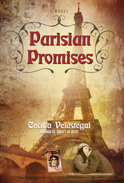"She'd learned from witnessing her mother's beatings that it was best to agree with every accusation and to apologize for any perceived crimes. Otherwise things only got worse."

 |
Parisian Promises by Cecilia Velástegui Libros Publishing
book review by John E. Roper
The romantic movies Hollywood produced in the middle of the twentieth century forever warped America's perception of Europe. Additionally, photojournalist Robert Doisneau contributed to the mythos with his black-and-white shots that captured only select aspects of Parisian life. His famous Le baiser de l'hotel de ville (Kiss by the Town Hall) of 1950 only enhanced the French capital's reputation as "The City of Love." But what the starry-eyed travelers from the U.S. during the late 60s and early 70s were often unaware of was that the social turbulence that was shaking up America during the time period was also reverberating in places like France as well, and that life beyond the facades of the tourist traps was often anything but romantic.
Award-winning author Cecilia Velástegui turns her attention in her latest novel to the years shortly after the Paris student riots of 1968 and to a time when the civil unrest that led to the violence still simmers. It is 1973, and Monica, Lola, Karen, and Annie, four young coeds from America, have come ostensibly to study for a year in France. However, like countless exchange students before them, they also dream of new adventures, new lives, and perhaps a chance at true love. Monica, the book's main protagonist, at first thinks she has found the man of her dreams in the mysterious and charismatic Jean-Michel. But she is so blinded with his initial charms that she fails to recognize the calculated, psychological trap he is laying for her. Nor does she suspect that Jean-Michel may have other, darker reasons for being with her than simply romantic intentions. What she doesn't know is that her lover and his South American compatriots have deliberately targeted her and her friends to be unwitting tools in a terrorist plot. Quite by accident, though, and through the aid of her landlord, the colorful Madam Caron de Pichet, Monica briefly escapes Jean-Michel's clutches and finds herself in the Loire Valley and falling in love with Christophe, the heir to a large estate. Jean-Michel, though, is not easily thwarted and is determined to recapture his chosen prey at any cost.
Velástegui spins a disturbing tale of abuse, shattered dreams, and the loss of innocence. The author's greatest strength, however, lies in her ability to create memorable characters. Jean-Michel, the bored, rich kid turned sociopathic revolutionary is intelligent, suave, and truly frightening in his unwavering focus to accomplish his agenda. Monica, in contrast, is a gullible innocent who without the intervention of others would undoubtedly be lost. Another interesting creation is Lola, the bawdy and brash coed who greatly admires and seeks to model in many ways the life of La Belle Otero, the famous 20th century courtesan. Ironically, it is the former member of the French Resistance and one of the many people Lola seems to take for granted, Madame Caron de Pichet, who resembles La Belle Otero the most, especially in the courtesan's last few years.
The author spent her early childhood in her home country of Ecuador before being raised in both California and France. This cross-cultural background along with her extensive travels aid Velástegui in making the worldviews of her principal characters and the atmosphere of life in Paris during the 1970s very realistic.
RECOMMENDED by the US Review